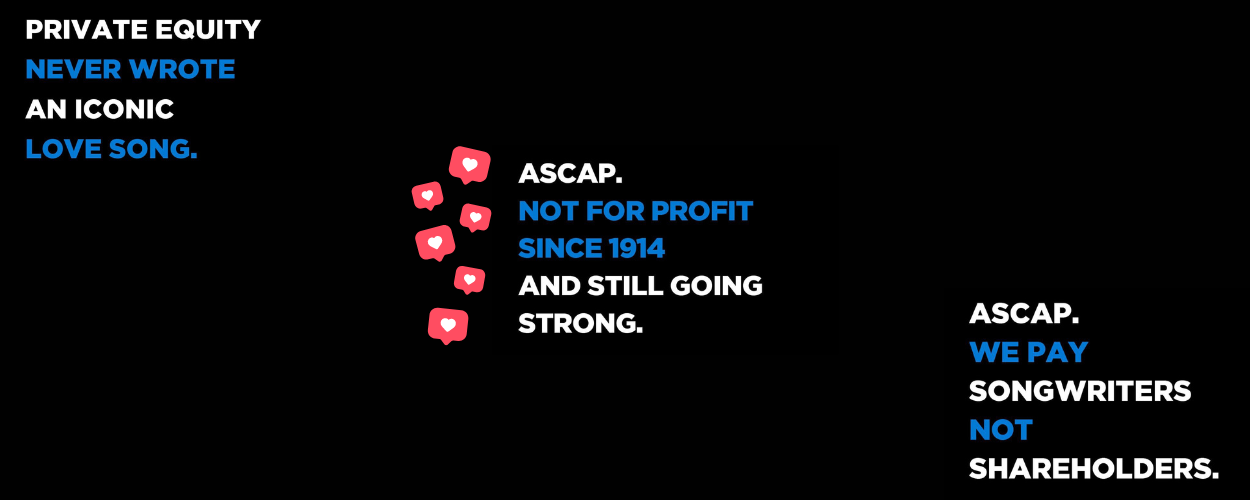This website uses cookies so that we can provide you with the best user experience possible. Cookie information is stored in your browser and performs functions such as recognising you when you return to our website and helping our team to understand which sections of the website you find most interesting and useful.
And Finally Business News Labels & Publishers
ASCAP takes advantage of growing controversy over imminent BMI sale
By Chris Cooke | Published on Thursday 31 August 2023

US collecting society ASCAP has been having some fun on social media this week posting not especially subtle digs at its rival BMI in response to reports that the latter rights organisation is close to being acquired by a private equity outfit.
Most of the music industry’s collecting societies around the world – including ASCAP – are not-for-profit organisations owned by their members, so usually some combination of artists, songwriters, record labels and/or music publishers.
However, BMI is actually owned by a group of broadcasters. But, until last year, it nevertheless operated on a not-for-profit basis, which meant most people didn’t notice. Then, last October, BMI announced it was becoming a for-profit enterprise, arguing that going that route would allow it to seek the investment required to expand and enhance the organisation.
That decision was made after BMI had considered selling itself. The society’s board initially decided not to sell, but then last month it was reported that talks were back on with possible buyers. And last week it was revealed that private equity firm New Mountain Capital was now a frontrunner to acquire the organisation.
All of that has prompted an assortment of groups representing songwriters to demand that BMI answer a bunch of questions about what impact the profit margin is having on the fees it charges on the royalties it processes; who will profit from any sale; and what having a new private equity owner will mean for the society and its members.
So far BMI has failed to answer any of those specific questions, instead putting out vague assurances that the decision to become a for-profit entity and any imminent sale is all in the interest of the songwriters whose songs it represents. A response that hasn’t in any way placated the songwriter groups.
In the US, there are a number of collecting societies that all represent the performing rights in songs, each representing a different set of writers and the songs they have written. So ASCAP and BMI compete with the smaller and also privately owned SESAC and GMR.
In most collective licensing scenarios, licensees – like radio stations and concert promoters – seek something nearing a blanket licence, meaning they really need to get licences from all four societies. This means the real competition between ASCAP, BMI, SESAC and GMR is within the songwriter community, where they compete for songwriter members.
As a result, while BMI and ASCAP regularly collaborate on lobbying and data projects, they very much compete when it comes to trying to persuade songwriters to sign up.
ASCAP has been using the controversies currently surrounding BMI’s for-profit status and imminent private equity deal to suggest that it is the American collecting society that is most focused on the interests of songwriters.
So, what’s your favourite BMI dig from ASCAP’s social media posts this week?
• ASCAP. Creators first. Not for profit. Not for sale.
• There is no “I” in ASCAP.
• ASCAP. We put our songwriters first in everything we do. Always.
• Private equity never wrote an iconic love song.
• ASCAP. Not for profit since 1914 and still going strong.
• ASCAP. Growth without greed.
• ASCAP writers. Who owns us? Who gets paid? You and you.
• ASCAP. We pay songwriters not shareholders.
• ASCAP. Where royalties and values unite.
• Humans first. We are not the artificial society of composers, authors and publishers.
Actually, the last one relates to the challenges posed by AI and ASCAP’s role in campaigning on all that for its members. I don’t think they’re suggesting BMI is run by robots. Well, not yet.





